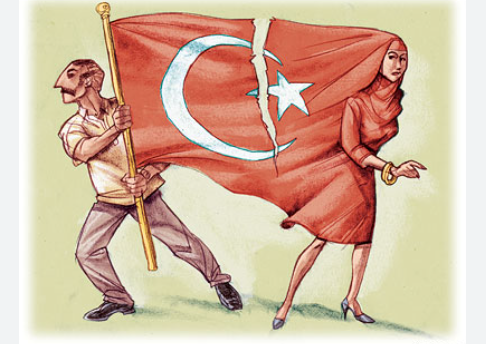Erdoğan is often criticized for his confrontational rhetoric towards the West, but in practice, he has little choice but to align with Western positions on most, if not all, issues. Erdoğan’s efforts to get closer to Russia, Iran and China over the last decade have not achieved the intended diversification in trade that would replace the crucial support provided by the West. It seems this pattern will continue into the foreseeable future unless significant changes occur.
This was the main reason why Erdoğan had to roll back unorthodox economic and financial policies and return to conventional macroeconomic policies last year.
Trade, investment and technology continue to be the West’s most significant leverage over Turkey, whose economy cannot be sustained without tens of billions of dollars flowing into its coffers.
According to a report prepared by the Ministry of Trade, Turkey’s trade with Europe and North America remains a lifeline for its economy. This is despite decades-long diversification efforts by the government of President Recep Tayyip Erdoğan, which has increasingly sought closer ties with Iran, Russia and China, often at the expense of its NATO allies.
In 2023, 41 percent of Turkey’s exports went to the 27 member states of the European Union, amounting to $104.3 billion out of a total export volume of $255.8 billion for that year. When including other European countries and North America, the total reaches $160.6 billion, or 62.8 percent overall.
The figures also indicate that the trade is largely balanced, meaning that Turkey imports relatively the same amount it exports to these countries. In 2023 Turkey’s imports from the EU stood at $106 billion, nearly the same amount as its exports to the bloc. Turkey had a positive trade balance of approximately $10 billion in 2022. Turkey exported slightly more than it imported from North American countries last year.
In sharp contrast Turkey’s trade with Russia and China had a significantly negative balance for Turkey last year, exacerbating its current account deficit. While Turkish exports to Russia amounted to $10.9 billion (4.3 percent of total exports), its imports from Russia stood at $45.6 billion (12.6 percent). In other words, Turkey spent more than three times as much financing the Russian economy than it received from it.
A similar pattern is evident in Turkey’s trade with China, which was the second-largest source of imports for Turkey after Russia, amounting to $45 billion. China is not even among the top 10 export destinations for Turkish products, resulting in a substantial negative trade balance for Turkey.
In terms of service sector exports such as tourism, logistics and transportation, Western countries remain crucial for Turkey as well. Last year 6.6 million people from Europe visited Turkey as tourists, accounting for 49.8 percent of the total, contributing to half of the $54.3 billion Turkey earned from tourism. The number of visitors from the US was 372,000, representing 2.47 percent of the total.
Understandably, there was a dramatic increase in Russian visitors choosing to travel to Turkey in 2022 and 2023, with 1.8 million tourists annually. In 2021 the number stood at 854,000. This surge was largely attributed to Western sanctions on Russia, which created difficulties in accessing financial and banking services in Western countries. Consequently, Russians opted for Turkey, which publicly declared it would not enforce Western sanctions and would facilitate Russians’ access to Turkish banking and financial institutions.
Regarding foreign direct investment (FDI) in Turkey, the West retains the majority of investment inflows, underscoring its critical role in supporting the Turkish economy. According to the latest data, Europe alone accounted for 69.6 percent of the FDI into the country, amounting to nearly $4 billion last year. The US held 4.6 percent of the investment share.
Between 2002 and 2024, spanning a little over two decades of President Erdoğan’s rule in Turkey, investments originating from Europe amounted to $136.4 billion. US investors contributed $15 billion to the Turkish economy during the same period. When considering indirect investment and the broader economic benefits derived from relations with the West, Turkey remains heavily dependent on Western support for the viability of its economy.
Furthermore, Europe and North America have been key markets for the Turkish manufacturing industry, which relies on imported intermediate goods, chemicals and high-end precision machinery to produce goods for export to the rest of the world.
The figures clearly show that Erdoğan’s efforts to get closer to Russia, Iran and China over the last decade have not achieved the intended diversification in trade that would replace the crucial support provided by the West. It seems this pattern will continue into the foreseeable future unless significant changes occur.
Erdoğan is often criticized for his confrontational rhetoric towards the West, but in practice, he has little choice but to align with Western positions on most, if not all, issues.
This was the main reason why Erdoğan had to roll back unorthodox economic and financial policies and return to conventional macroeconomic policies last year.
Nevertheless, this bitter truth does not deter him from seizing opportunities when they arise, such as facilitating sanction-busting tactics for Russians and Iranians, and allowing the Chinese to establish a strong foothold in the Turkish economy in exchange for undisclosed agreements that enrich himself and his associates, often at the expense of Turkey’s national interests.
Abdullah Bozkurt, a Middle East Forum Milstein Writing Fellow, is a Sweden-based investigative journalist and analyst who runs the Nordic Research and Monitoring Network and is chairman of the Stockholm Center for Freedom. This is an excerpt from the original.
Follow our English language YouTube videos @ REAL TURKEY: https://www.youtube.com/channel/UCKpFJB4GFiNkhmpVZQ_d9Rg
And content at Twitter: @AtillaEng
Facebook: Real Turkey Channel: https://www.facebook.com/realturkeychannel/
